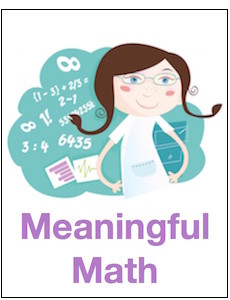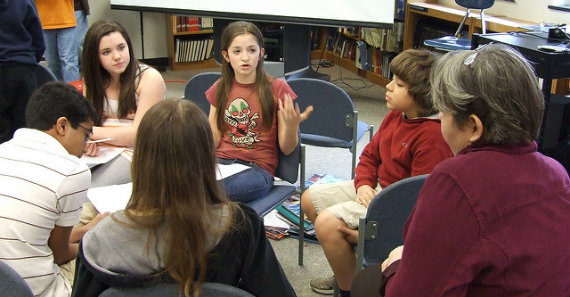Listening Closely to Student Math Talk
A MiddleWeb Blog
 A few weeks ago I led a study session to help students prepare for an AP exam. I put students in groups of 2 or 3 and asked them to discuss and answer multiple choice questions. These were not my students and we were not in my classroom, nor my school.
A few weeks ago I led a study session to help students prepare for an AP exam. I put students in groups of 2 or 3 and asked them to discuss and answer multiple choice questions. These were not my students and we were not in my classroom, nor my school.
I walked from group to group and listened, I mean really listened. There were some very good discussions. Sometimes students would get something wrong, but for the most part they were able to talk it out and reach the right answer. When they didn’t get the right answer, it helped me understand what their misconceptions were. I learned so much!
Turns out, just listening, really listening, to students provided me with some great formative assessment. I have always known that it is helpful to the students to talk with their peers about math. I think math talk helps students solidify their thinking, make connections, and remember what they have learned. What I have been underestimating is how much it would help me.
Teacher as Listener
On the way home (it was a six-hour drive) I started thinking about why I seemed to get so much more from listening to students during this workshop than I usually do in my own classroom. And I do walk around and try to listen to my students as they discuss math problems and concepts.
It dawned on me that, at the workshop, I wasn’t responsible for all the logistics that normally accompany the classroom experience. I didn’t have to take attendance, I didn’t have to answer the intercom or check my email for a list of students who would be on a field trip. In my own classroom my attention is divided. At the workshop I was able to focus on the math learning process and really listen to what the students were saying.
So, I am glad I had this opportunity because it reminded me how important math talk is in the classroom. Although I can’t eliminate distractions in my own teaching space, I can control how I respond to them.
By the time I got home, I was really determined to make it a regular habit to encourage math talk, so I decided to do some research. I was looking for some specific information:
1.) Strategies (activities) that would promote student conversations about math and would fit into my current classroom routine.
2.) How I can become a better listener and actually focus on what my students are saying.
Strategies and Activities that Promote Math Talk
I remembered that the Formative Assessment Lessons provided by MARS (Mathematics Assessment Resource Service) dealt with the teachers’ role while students discussed math activities. (If you haven’t had the chance to do a formative assessment lesson, I really recommend that you try one.) Embedded in almost every lesson is an activity for a student to do with a partner, such as a card sort or some matching activity.
After we return from Christmas Break will be a great time to incorporate a MARS lesson. I am looking at Properties of Exponents (8th grade). As students work with a partner to match equivalent expressions, the teacher is instructed to “note different student approaches to the task and to support student problem solving.” The teachers are further instructed to “listen to…students carefully.” (Source) I’m excited to try this lesson, with renewed attention to listening and the goal of formatively assessing my students’ understanding.
Eavesdropping on the Gallery Walk
Another strategy that I want to try is called a Gallery Walk. I have used Gallery Walks in the past, but I wanted to focus on listening closely to students’ discussions as they rotated through the “Gallery.” Here are some gallery walk ideas that will get students talking.
The way it works is that students are given a problem, which they work on in small groups. They then post their solution on chart paper. Groups spend 3-5 minutes at each posted solution and add comments and suggestions which they write on sticky notes.
Groups rotate until every group has had a chance to visit each chart poster, giving students an opportunity to “discuss their classmates’ solutions.” As students are having these discussions, the teacher listens, observes, and “gauges student understanding.”
Becoming a Better Listener
I have had to admit that I am not always a good listener. I think my attempts to multi-task have caused me to develop some bad listening habits, which has kept me from really benefiting when I try to listen to students’ discussions about math. To a degree, multi-tasking is unavoidable for teachers, but I can certainly make the effort to improve my listening skills.
I found the following articles to be helpful: Training the Brain to Listen: A Practical Strategy for Student Learning and Classroom Management and 9 Listening Strategies that Develop Active Listeners. Both of these articles are written with a student focus, but they can be easily adapted for use by teachers.
“9 Listening Strategies that Develop Active Listeners” suggested that making predictions as to what would be said would increase listening skills. To adapt that suggestion for my classroom, I plan to work the problem that the students are working in advance, and do so using more than one method. I plan to really think about how students might approach the problem and what misconceptions they might have.
Another suggestion was to take notes. In practice, I do find it easier to focus when taking short notes. Question-writing is also useful. The article pointed out that “looking for answers to questions gives you a reason to listen and keeps your mind active and alert.” So, before the activity, I plan to create questions that I can quickly ask myself during the course of the students’ math talk. For example, what strategy/strategies did the student use? Or perhaps, what did the students learn from this activity? Or what misconceptions did students have?
Looking Forward
In the coming months I plan to spend more time listening and providing students with an opportunity to talk to each other. I know I need to continue to hone and improve my listening skills and make the effort to implement activities that encourage math talk.
If anyone has any suggestions for how to promote good student math discussions, or tips for being a better listener, please share!
Additional Resources I found helpful
Talking Math: 6 Strategies for Getting Students to Engage in Mathematical Discourse
How to Improve Mathematical Discourse in Your Classroom
7 Ways to Help Students Become Active Listeners
Photo credits: Kevin Jarrett, Bigstock





































This is great – I am always eavesdropping on my student discussions. One thing that helps make the learning more powerful for the class too is when I share with the large group either misconceptions that I heard – or ask a group to share a strategy – with the class. This helps others gain in the understanding or in helping to “clear up” a misconception.
I totally agree with you that student collaboration and discussion is key to deepening understanding in math. Another means of communication that we are working on to deepen understanding is writing in mathematics. I have been using writing to ask students to justify their answers with evidence – such as examples, non-examples, and definitions. It has been amazing to see what they write and how well they understand each concept.
Thanks so much for sharing this post with me!
Thank you for your comment! Great point about misconceptions. You are so right, it helps the whole class to share common misconceptions. I also like the idea of asking a group to share their strategy. Great suggestions! Thanks!
Hi Michelle, this is a great article. I’ve been a math teacher for over 15 years. Thank you for bringing attention to the importance of listening to students as they communicate about mathematics!
Michelle, thanks for sharing ways to conduct formative assessment in ways that don’t require creating, administering, and correcting quizzes! I’d add, writing to learn in math. Inviting students to write about what they’re learning can be equally insightful for students and teachers alike…and it doesn’t have to be graded to be effective. See ideas in MORE ABOUT WRITING (2019) that was reviewed last month here on MIDDLE WEB. https://www.middleweb.com/40270/teaching-english-in-the-middle-school-years/